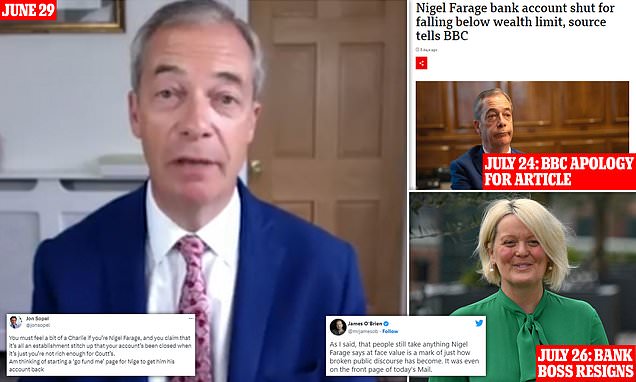How the gloating Left-wing Twitterati celebrated as Nigel Farage was cancelled by Coutts for his political views… before outrage engulfed NatWest in crisis and boss Alison Rose was forced to quit over BBC briefing
News that Nigel Farage had been ditched by Coutts came like manna from heaven for the left-wing commentariat, who took to their favourite platform – Twitter – to celebrate his demise.
A BBC report, quoting a source at the prestigious bank, stated that the former UKIP leader had failed to meet its minimum wealth requirements – seemingly a clear rebuttal of his claim to have been ‘cancelled’ for his political opinions.
The development was hailed by prominent left-wing media figures including LBC presenter James O’Brien, broadcaster India Willoughby and Jon Sopel – the former BBC North America correspondent turned podcast host.
How awkward, therefore, for a dossier to emerge within days proving Mr Farage to have been absolutely right – his political views had indeed been a key factor in his ‘de-banking’.
And, to make matters worse, the source of the BBC story was none other than Dame Alison Rose – CEO of Coutts’ parent group NatWest.
Following Dame Alison’s dramatic resignation last night, here is a recap of how the saga unfolded.
The root of the Coutts debacle was a video Mr Farage posted on Twitter on Thursday, June 29.
Appearing in his living room wearing a blue jacket and pink tie, the politician turned broadcaster revealed he had been informed by a ‘very prestigious’ bank that his account would be closed.
He told the camera: ‘I got a phone call a couple of months ago to say ”we are closing your accounts”, I asked ”why”, no reason was given. I was told a letter would come which will explain everything, the letter came through and simply said ”we are closing your accounts, we want to finish it all by a date”, which is around about now. I didn’t quite know what to make of it, I complained, I emailed the chairman, a lackey phoned me to say that it was a commercial decision, which I have to say, I don’t believe for a single moment.’
Mr Farage said he had tried to open accounts with seven other banks but had been turned down. Complaining he had been made to feel like a ‘non-person’, he said he feared soon being unable to borrow money, get a mortgage, or obtain a debit or credit card.
While Mr Farage did not name Coutts in the initial broadcast, it was immediately understood to be the bank he was referring to.
The root of the Coutts debacle was a video Mr Farage posted on Twitter on Thursday, June 29, where he said a ‘very prestigious’ bank had told him it was closing his account
Mr Farage’s video lit the touchpaper on a debate that had been raging for some time, with the Treasury previously opening a consultation after the right-leaning journalist Toby Young complained that a PayPal account run by his Free Speech Union had been frozen last September.
READ MORE – Moment furious Nigel Farage snaps at BBC’s Nick Robinson and blasts Radio 4 Today host’s ‘condescending tone’
On July 3, it emerged Chancellor Jeremy Hunt was ‘deeply concerned’ that lenders were blacklisting customers deemed to hold contrary political beliefs and social values.
City minister Andrew Griffith was tasked with investigating cases where lenders had closed the accounts of individuals or companies whose beliefs they disagree with on issues such as Brexit, gender or sexuality.
Mr Griffith told the Financial Times: ‘Banks and payment providers occupy a privileged place in society and it would be a concern if financial services were being denied to those exercising the right to lawful free speech’.
Yet just as Conservative figures weighed in behind Mr Farage, a bombshell report dropped on the BBC website by its business editor, Simon Jack.
Published a day later, on July 4, it reported that Mr Farage’s Coutts account had been shut down not because the bank didn’t like his views, but because he had failed to meet its requirement to borrow or invest at least £1million or hold £3million in savings.
The article quoted a source at the bank – which has been the pre-eminent financial lender for the great and good of British society for 331 years.
On July 4, the BBC reported that Mr Farage’s account has been closed because he fell below the required wealth limit
The article prompted a storm of mockery for Mr Farage on Twitter, where it was seen as evidence he had lied about being a victim of political persecution
This prompted a storm of mockery for Mr Farage on Twitter, where it was seen as evidence he had spun a dispassionate commercial decision into a political witch hunt.
James O’Brien tweeted: ‘As I said, that people still take anything Nigel Farage says at face value is a mark of just how broken public discourse has become. It was even on the front page of today’s Mail.’
READ MORE – Farage warns TEN banks who have refused him accounts that they could suffer same fate as NatWest as he steps up war on ‘woke’ culture
India Willoughby, the TV personality and presenter, wrote: ‘What a shock. Turns out the Nigel Farage ‘I’ve been cancelled by my bank’ story was a crock of s***. Just like last week’s trans cat kids. Who’d have guessed? No wonder nobody can trust what they read or hear anymore. Serious problem.’
Journalist Jon Sopel also joined the communal guffawing, tweeting: ‘You must feel a bit of a Charlie if you’re Nigel Farage, and you claim that it’s all an establishment stitch up that your account’s been closed when it’s just you’re not rich enough for Coutts. Am thinking of starting a ‘go fund me’ page for Nige to get him his account back.’
With the scandal apparently solved, things went quiet for a while – even as Mr Farage fought behind the scenes to obtain evidence to support his initial claim.
Then, in a major development on July 18, he finally obtained his proof: an internal dossier which showed Coutts had cited his retweet of a Ricky Gervais joke and his friendship with Novak Djokovic to raise concerns he was ‘xenophobic and racist’.
The extraordinary documents, handed to MailOnline, revealed the 331-year-old bank decided to ‘exit’ him after making reference to his friendship with former Wimbledon champion Djokovic.
On July 18, Mr Farage published an internal dossier which showed Coutts cited his retweet of a Ricky Gervais joke and his friendship with Novak Djokovic to raise concerns he was ‘xenophobic and racist’
The dossier says that Mr Farage’s EC – his ‘economic contribution’ is now ‘sufficient to retain on a commercial basis’
Page four of the dossier reported various disputed claims about Mr Farage, some of them disputed
The tennis player, who lost in the men’s singles final in SW19 on Sunday, made headlines over his decision not to have the Covid-19 vaccine during the pandemic.
The dossier also showed the bank’s discussions considered 13 tweets, including a retweet by Mr Farage of a video of a Ricky Gervais sketch posted by Laurence Fox satirising the transgender movement. In the scene Gervais made a joke about ‘old-fashioned women – the ones with wombs’.
READMORE – Lloyds Banking Group sees a huge profit boost thanks to interest rate hikes – and Santander UK also reports bumper first half of the year
Among those to apologise after the dossier’s publication was Jon Sopel, who tweeted: ‘Dear Nigel, Always believed when I get things wrong, I own up to it. I got it wrong. Sorry. That will teach me to trust reporting of my old employer.
‘If your political views were even part of the reason why the account was suspended from #Coutts that is totally reprehensible.’
Meanwhile, Tory ministers lined up behind Mr Farage, with Home Secretary Suella Braverman branding the situation ‘sinister’.
Energy Secretary Grant Shapps – who has clashed bitterly with Mr Farage before – said it was a ‘disgrace’. Labour MPs also broke cover to voice disquiet.
Mounting pressure saw Simon Jack issue his own apology on July 24, tweeting: ‘The information on which we based our reporting on Nigel Farage and his bank accounts came from a trusted and senior source.
‘However the information turned out to be incomplete and inaccurate. Therefore I would like to apologise to Mr Farage.’
Jon Sopel was among those to apologise to Mr Farage after poking fun at the former UKIP leader
The BBC amended its online article on July 21 and apologised to Mr Farage. The former UKIP leader accepted the apology and said he did not blame the corporation
BBC News chief executive Deborah Turness wrote a letter to Mr Farage, and the corporation confirmed its official apology on its corrections and clarifications website on July 24.
The BBC had already updated its original article on July 21, saying it had ‘not been accurate’.
Mr Farage thanked the corporation and Mr Jack, saying: ‘There is no fault or no blame on the BBC. This now goes right back to the Natwest Banking Group [owners of Coutts].’
There followed inevitable speculation about the source of the claims on which the article was based.
The answer finally came yesterday – July 25 – when NatWest CEO Alison Rose revealed she had discussed Mr Farage’s financial affairs with Mr Jack at a charity dinner.
Despite admitting to a ‘serious error’ of judgment she fought to cling on to her £5million-a-year post – gaining the backing of the NatWest board who declared their ‘full confidence’ in her following an emergency meeting.
But the CEO finally fell on her sword in the early hours of the morning following an intervention from the Prime Minister and Chancellor, who made clear their ‘significant concerns’.
Dame Alison Rose (pictured) was forced to quit in the early hours of this morning after confirming she had been the source of the article
It followed an intervention from the Prime Minister (right) and Chancellor (left), who made clear their ‘significant concerns’
Today, NatWest remains embroiled in a full-blown crisis, with its shares falling by 3 per cent following Dame Alison’s resignation.
Meanwhile, Mr Farage hailed her departure as a ‘start’ – but claimed ‘the whole Board needs to go’ after backing her abortive attempt to stay in post.
‘She’s gone, and that’s a start, but I have to say that (Coutts chief executive) Peter Flavel … (NatWest chair) Howard Davies … it was the board that sanctioned this culture that talks about diversity and inclusion, and actually is very divisive,’ he said.
‘In my case, as you can clearly see, pretty poisonous stuff. I think any board member that endorsed that statement last night, where they said ‘yes, she breached confidentiality, but she can stay in her post’… frankly, I think the whole board needs to go.’
City minister Andrew Griffith – who was due to hold a summit with banking chiefs including Dame Alison this morning – wrote on Twitter: ‘It is right that the NatWest CEO has resigned.
‘This would never have happened if NatWest had not taken it upon itself to withdraw a bank account due to someone’s lawful political views. That was and is always unacceptable.
‘I hope the whole financial sector learns from this incident. Its role is to serve customers well and fairly – not to tell them how or what to think.’
Labour leader Sir Keir Starmer said that NatWest was in the ‘wrong’ and that it was right for Dame Alison Rose to resign.
Speaking to Nicky Campbell on BBC Radio 5 Live, he said: ‘NatWest got this one wrong. And that’s why Alison Rose had to resign.’
Asked if he felt sorry for Mr Farage, he said: ‘Yeah, he shouldn’t have had his personal details revealed like that. It doesn’t matter who you are, that’s a general rule.’
Number 10 confirmed Dame Alison Rose was no longer a member of Mr Sunak’s business council following her resignation.
Source: Read Full Article
















